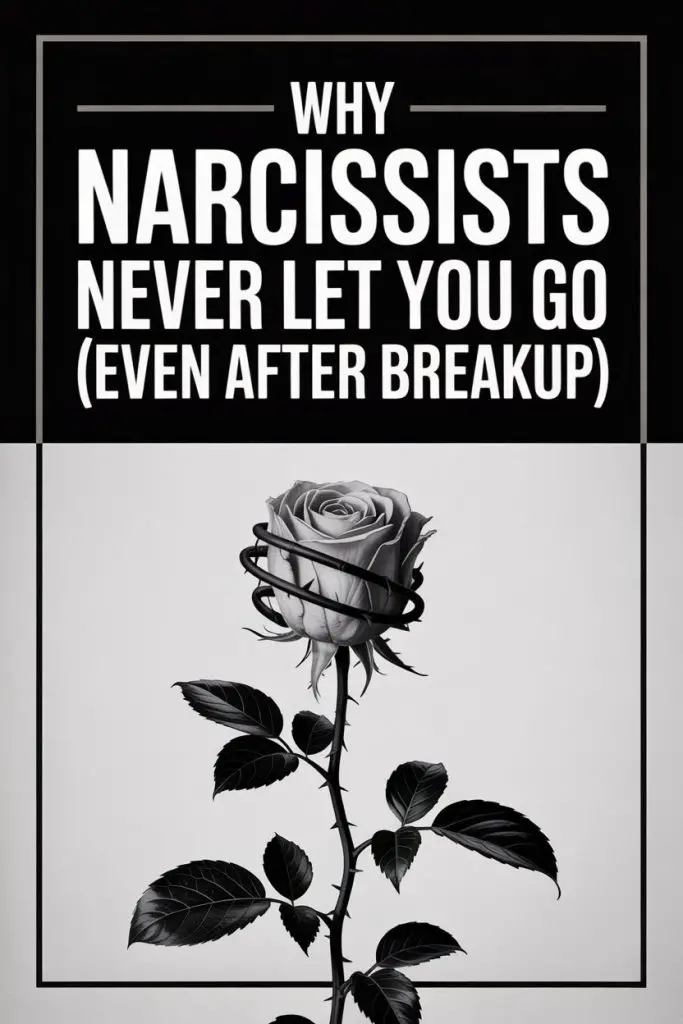Ever tried breaking up with a narcissist? It’s a bit like trying to delete a stubborn app from your phone. You think it’s gone, but then—ping!—there’s that notification.
They’re back, lurking in your inbox, comments, or, if you’re really lucky, through mutual friends who’d rather not be in the middle.
What gives? Why do narcissists refuse to exit stage left, even when the curtains have well and truly closed? Grab your cuppa, because here’s what’s really going on behind their ghostly encore performances.
The Addiction to Supply
Narcissists don’t just want attention—they need it. Like a plant that only survives on a diet of constant validation, a narcissist’s ego withers without fresh admiration and drama.
When you break up, the well of attention doesn’t just dry up overnight. If you once supplied them with fawning, reassurance, fiery arguments, or even just your confusion—they’re desperate to keep that flowing.
Doesn’t matter if it’s love or loathing. Narcissists thrive on any emotional reaction.
Ghosting you entirely would mean losing a reliable source of ego snacks. And trust me—nobody loves their snacks like a narcissist.
Control Freaks R Us
Narcissists pride themselves on being the ones to call the shots. If you were the one who ended things, they might feel their carefully curated narrative slipping through their fingers.
Cue the reconquest mission.
They’ll pop back up with messages, apologies, feigned confusion, or “just checking in” as if a breakup was merely a suggestion. The goal? To flip the script.
If they can persuade you to reconnect—or at least keep you emotionally tangled—they’re king or queen of the chessboard once more.
Even when they pretend to move on, they’ll ensure you know about it. New partner? Watch for the Instagram parade.
Ego Bruise: Handle With Extreme Care
You know how some folks bounce back from rejection with a pint of ice cream and a power ballad? Not so with narcissists. Any form of rejection—especially from someone they believed was hooked—feels like an existential threat.
Rather than licking their wounds quietly, they’ll often reappear to prove they’re still irresistible, still in control, and still the one who gets the final word.
This might look like flattery, then insults, then guilt trips, then radio silence—until it’s not. It’s all part of the same cycle.
If you’re wondering why your ex can’t just leave you alone, remember: their ego is built on shaky scaffolding, and you’re the missing bolt.
FOMO, But Make It Personal
There’s a healthy version of FOMO (Fear Of Missing Out); maybe you feel a pang when friends go to a gig without you.
Narcissists, though, experience FOMO with a twist—they’re convinced that if you move on, you might actually be happier. Without them. The audacity!
They can’t stand the idea of you thriving, finding someone kinder, or just living your best life. If there’s a chance you might be happy elsewhere, they’ll often try to worm their way back in.
Sometimes this looks like nostalgia-laden texts. Sometimes, it’s full-blown sabotage.
It’s not about you. It’s about keeping you in their orbit, just in case.
Hoovering: Not Just for Carpets
Psychologists call it “hoovering,” named after the vacuum brand. Narcissists are notorious for sucking you back in with grand gestures, sudden vulnerability, or “accidentally” bumping into you at your favourite café.
Hoovering works because it preys on your nostalgia and hopes that things might be different this time. The apologies sound heartfelt; the promises seem new. But the playbook rarely changes.
If you find yourself wondering, “Am I overreacting, or is this manipulative?” there’s a good chance you’re witnessing classic hoovering in action.
The Pity Parade
Narcissists aren’t above playing the victim. You might hear how they’re struggling without you, how nobody understands them, or that they’ve learned from their mistakes.
Maybe they suddenly have a string of calamities—illness, job woes, existential crises.
The goal here is to trigger your empathy. They know you’re a good person (many survivors of narcissistic relationships are). If they can tug on your heartstrings, you’re less likely to enforce boundaries.
This ploy can make you feel guilty for moving on, tempting you to resume contact or offer comfort. Classic bait-and-switch.
The Old “Just Friends” Routine
You’ve made it clear you’re not interested in rekindling romance. No problem, says the narcissist—they just want to be “friends.” Or do they?
This is rarely about friendship as you know it. Friendship is mutual. For narcissists, it’s a foot in the door, an excuse to stay involved in your life, and a way to gather intel.
They might probe about your new relationships, your mood, or your whereabouts.
Beware the “friendly” ex who keeps tabs on you, then suddenly gets cold or competitive when you’re thriving. Real friends want to see you happy, not back in their web.
Social Media Shenanigans
The digital age has given narcissists a whole new set of tools. Gone are the days when changing your number meant real distance.
Now, there’s Instagram lurking, cryptic stories, and those “accidentally” liked photos from 57 weeks ago.
This isn’t just about curiosity. It’s about reminding you they’re there, watching, and maybe even thriving. Bonus points if their posts seem tailored to make you jealous or trigger a reaction.
If you’re feeling triggered by their online presence, block, mute, or unfollow without a second thought. Your sanity is worth more than their next Instagram story.
The New Supply Show-off
Once they sense you’re really moving on, some narcissists will fast-track a new relationship—often very publicly. This “replacement” is trotted out not just for their benefit, but for yours.
If you catch yourself comparing yourself to the new person, it’s working according to plan. The aim is to spark insecurity, make you question your worth, or even lure you back into the old dynamic.
The antidote? Remind yourself that this is theatre, not reality. People who heal don’t need to rush into a new romance for show. Let them have their audience—you’ve got better things to do.
How to Break the Cycle Tonight
Recognising the patterns is half the battle. What now? Here’s what actually works when you’re ready to reclaim your peace:
- Gray rock method: Become as interesting as a wet dishcloth. Respond (if necessary) with neutral, one-word answers. Starve the drama of oxygen.
- Block and bless: Unfriend, block, and cut off digital contact wherever possible. This isn’t cruel—it’s self-care.
- Enlist your crew: Let friends and family know what’s up. Ask them not to pass on messages or updates.
- Refuse to bite: Emotional baiting comes in many forms—anger, pity, even flattery. Keep your responses short and boring.
- Therapy or support groups: If the cycle’s especially sticky, talk it out with people who get it. You’re not alone, and there’s no shame in needing backup.
When Freedom Feels Possible
Narcissists are famous for lingering in the wings, but you don’t have to keep handing them a ticket to the show.
Their refusal to let go isn’t a reflection of your worth or your ability to move on—it’s their own inability to fill their cup without draining yours.
Draw your boundaries with boldness. Celebrate every day of silence as a win. And remember: there’s more to life than being someone’s backup plan, emotional crutch, or ego boost.
The best revenge is to live well, laugh often, and keep your dance card full—for people who actually deserve your time.


